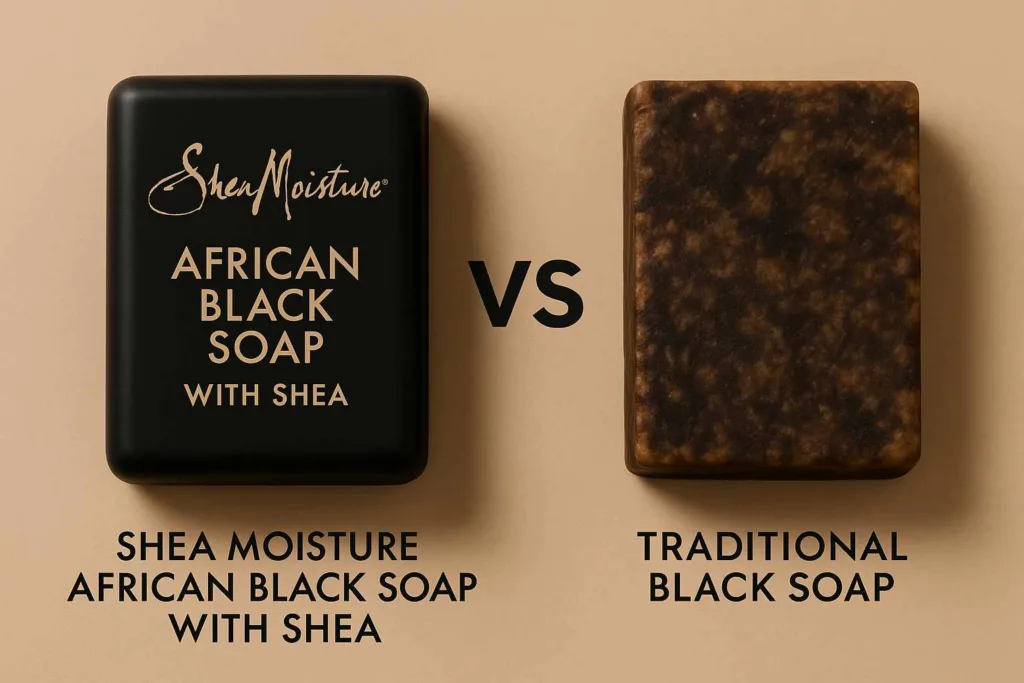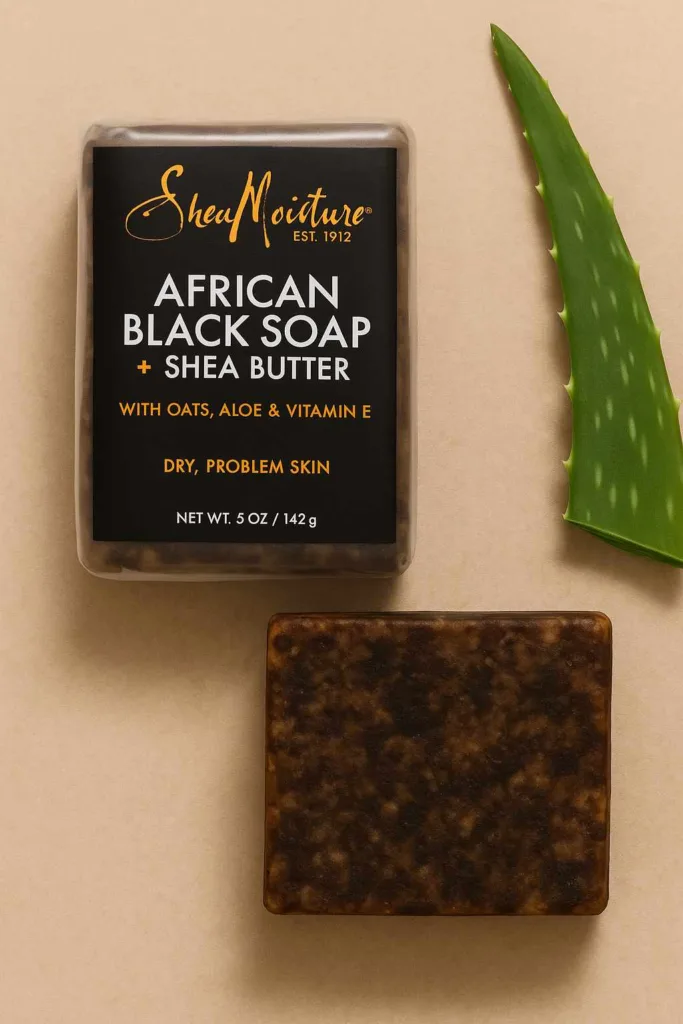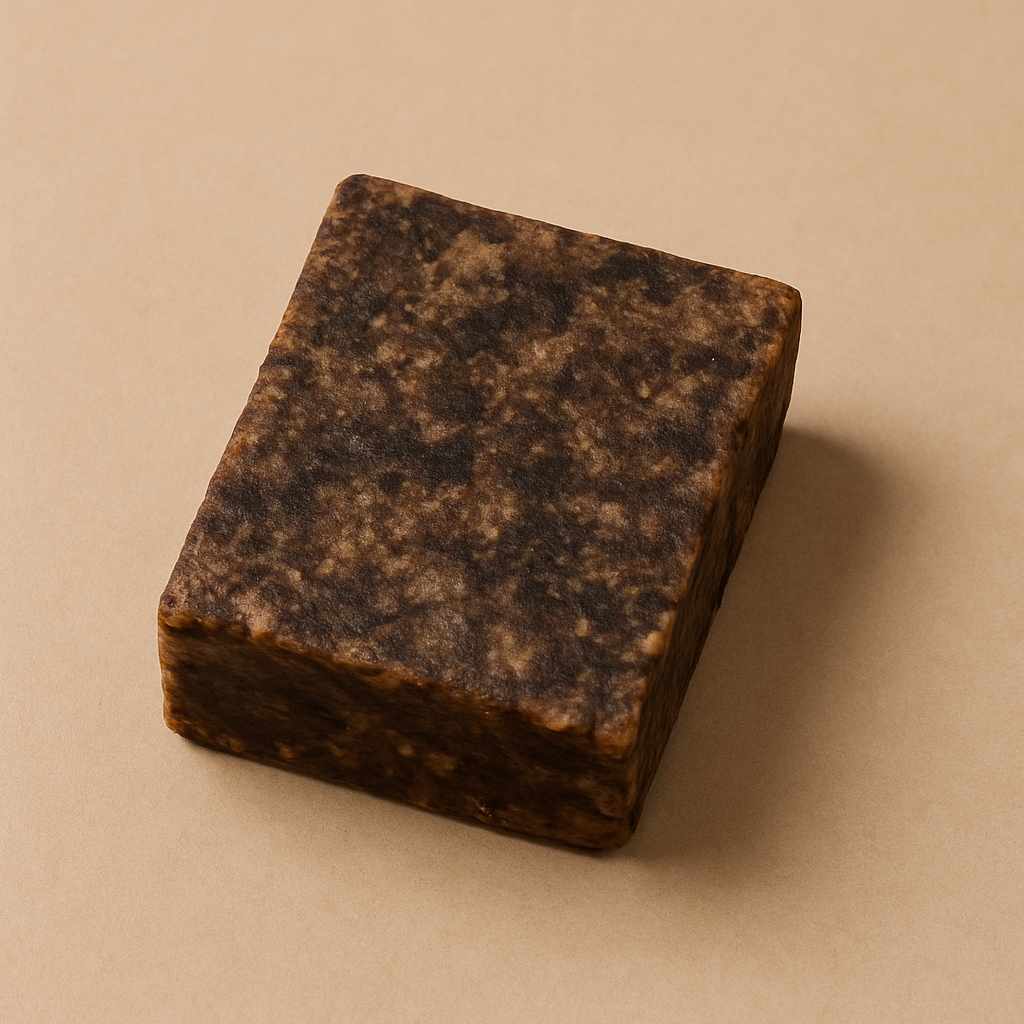As someone who’s spent years exploring natural skincare, I’ve always been drawn to African Black Soap. Its reputation for cleansing, soothing, and balancing skin—rooted in centuries of West African tradition—made it a staple in my routine. But when I stumbled upon Shea Moisture African Black Soap with Shea, I began to wonder: How does this commercial version compare to the traditional, handcrafted bars I’d grown used to?
Over the past two months, I tested both side by side, tracking everything from lather quality to long-term effects on my combination skin. What I found surprised me: while both share core benefits, their differences in ingredients, texture, and performance make them better suited for different needs. If you’re trying to decide which one belongs in your bathroom, let’s break down the details. You can Compare Shea Moisture African Black Soap to traditional formulas here to see for yourself.

What Is African Black Soap? Traditional vs. Commercial
To understand the differences, we first need to define what this soap truly is. Traditional African Black Soap—known locally as “savon noir” or “ose dudu”—originates from countries like Ghana, Nigeria, and Senegal. For generations, it’s been made by hand using a simple, time-honored process: roasting plantain skins and cocoa pods over open fires, then mixing the ashes with oils (typically palm kernel oil, coconut oil, or shea butter) and water. The mixture is cured for weeks, forming a hard, dark bar with a rough texture and earthy scent.
What makes traditional batches unique is their minimalism. They contain no preservatives, fragrances, or additives—just the natural properties of their ingredients. Plantain skins provide gentle exfoliation and vitamins A and C, while cocoa pods offer antioxidants. Shea butter, when included, adds deep moisture, making them suitable for dry skin. This simplicity is their strength: gentle enough for daily use but powerful enough to tackle acne, oiliness, and dullness.
Commercial versions, like Shea Moisture African Black Soap with Shea, build on this foundation but adapt it for modern consumers. They retain the core ingredients—plantain, cocoa, and oils—but often refine the texture, add extra beneficial components, and standardize the formula for consistency. This isn’t necessarily a bad thing; commercialization can make the soap more accessible and easier to use, though it does change the product’s character.
Traditional bars are often sold in unlabeled chunks, with quality relying on the skill of the maker. Each batch can vary in hardness, scent, and lathering ability, which adds to their artisanal appeal but can be inconsistent for users seeking reliability. On the other hand, Shea Moisture African Black Soap with Shea comes in neatly packaged bars with clear ingredient lists, making it easier for consumers to know exactly what they’re putting on their skin.
What Makes Shea Moisture African Black Soap with Shea Special?
Shea Moisture African Black Soap with Shea stands out among commercial variants for its intentional blend of tradition and innovation. Let’s start with its ingredients: while traditional bars may include shea butter in small amounts, this version puts the ingredient front and center. The brand sources raw shea butter from women’s cooperatives in West Africa, emphasizing its commitment to fair trade and sustainability.
This extra shea butter makes a noticeable difference. Traditional formulas can feel drying to some skin types, especially with frequent use. In contrast, Shea Moisture African Black Soap with Shea has a richer, creamier lather that cleanses without stripping moisture. It also includes other skin-loving additives like aloe vera, which soothes irritation, and tea tree oil, known for its antibacterial properties—both of which enhance its effectiveness for acne-prone skin.
Texture-wise, Shea Moisture African Black Soap with Shea is smoother than traditional bars. Older versions often have a grainy, uneven feel due to their unrefined nature, which can be a turnoff for those used to commercial soaps. This modern variant, however, is pressed into a uniform bar that’s easy to handle and lathers quickly—ideal for busy mornings or travel.
Perhaps most importantly, Shea Moisture African Black Soap with Shea undergoes rigorous testing to ensure consistency. Traditional batches can vary from one to the next (part of their charm, for some), but this version delivers the same experience every time, which is reassuring for those who want predictable results.
Another key feature is its pH balance. While traditional formulas tend to have a higher pH, which can temporarily disrupt the skin’s natural acid mantle, Shea Moisture African Black Soap with Shea is formulated to be closer to the skin’s natural pH, reducing the risk of irritation. This makes it a better choice for those with sensitive skin or anyone new to using natural soaps.
Week-by-Week Trial: Skin Changes & Reactions
To put both options to the test, I used traditional African Black Soap on my left side of the face and body, and Shea Moisture African Black Soap with Shea on my right, for four weeks. Here’s what happened:
Week 1: Adjustment Period
Both soaps initially caused mild tingling—normal for products with natural exfoliants. The traditional bar lathered less than Shea Moisture African Black Soap with Shea, which produced a thick, creamy foam. By day 3, I noticed my left cheek (traditional soap) felt tighter, while my right cheek (the modern variant) stayed soft. I wondered, “Is shea moisture african black soap real in the traditional sense?” but the similarity in core ingredients reassured me—it just had extra benefits.
I also paid attention to how each soap interacted with my morning moisturizer. The traditional bar left my skin feeling so dry that my moisturizer took longer to absorb, while Shea Moisture African Black Soap with Shea allowed my moisturizer to sink in quickly, leaving my skin feeling plump and hydrated throughout the day.
Week 2: Oil Balance
My T-zone, which usually gets oily by noon, showed noticeable differences. The traditional formula kept oil at bay but left my skin looking matte to the point of dullness. Shea Moisture African Black Soap with Shea, however, balanced oil without sacrificing radiance—my skin looked fresh, not flat. I also noticed fewer small pimples on the right side, hinting at acne shea moisture african black soap benefits.
A friend who has struggled with oily skin for years tried both and shared a similar observation: “The traditional soap made my skin feel like it was ‘squeaky clean,’ but by the end of the day, I was oilier than before. Shea Moisture African Black Soap with Shea kept my oil in check without that rebound effect.”
Week 3: Texture Improvements
Rough patches around my nose and chin began to smooth with both, but Shea Moisture African Black Soap with Shea worked faster. Its blend of shea butter and aloe seemed to speed up skin turnover, leaving the right side of my face noticeably softer. The traditional bar, while effective, required extra moisturizer to prevent flakiness.
I also tested both on my hands, which tend to get dry from frequent washing. The traditional soap left my hands feeling tight and rough, even after applying hand cream. Shea Moisture African Black Soap with Shea, however, left my hands feeling clean and soft, with no need for immediate moisturizing.
Week 4: Long-Term Effects
By the end of the month, both sides were clearer, but the right side (Shea Moisture African Black Soap with Shea) had fewer post-acne marks and a more even tone. My body showed similar results: the traditional bar cleared bacne but left my elbows dry, while the modern variant kept skin hydrated and smooth.
I also noticed that my makeup applied more smoothly on the right side of my face. The traditional soap had left my skin with a slightly uneven texture, causing my foundation to cling to dry patches. With Shea Moisture African Black Soap with Shea, my foundation glided on evenly, giving me a more natural finish.
Sensitive Skin & Eczema: Which Soap Performs Better?
For those with sensitive skin or eczema, the choice between traditional African Black Soap and Shea Moisture African Black Soap with Shea is critical. I tested both on a friend with mild eczema, who described her experience:
“Traditional bars burned a little on my flare-ups, even when I rinsed quickly. But Shea Moisture African Black Soap with Shea felt soothing—it didn’t irritate my sensitive patches at all. After two weeks, my eczema looked calmer, and I didn’t need to apply steroid cream as often.”
This aligns with what Healthline reports about eczema-friendly soaps: products with added moisturizers like shea butter are less likely to disrupt the skin barrier. Shea Moisture African Black Soap with Shea even offers a specific variant: shea moisture african black soap eczema therapy bar soap, which includes colloidal oatmeal for extra soothing.
Traditional formulas, while natural, lack these added protections. Their higher pH (common in unrefined soaps) can temporarily disrupt the skin’s acid mantle, making them riskier for eczema-prone skin. For most people with sensitivity, Shea Moisture African Black Soap with Shea is the safer bet.
Another friend with rosacea also tried both and found that the modern variant didn’t trigger the redness and flushing that the traditional soap did. She noted, “The shea butter in the Shea Moisture version seems to calm my skin, while the traditional soap made it feel irritated.”

Hair & Scalp Uses (Bonus Insight)
One unexpected discovery: both options work wonders on hair and scalps, but Shea Moisture African Black Soap with Shea has an edge here too. I tested traditional African Black Soap as a clarifying shampoo, which removed buildup but left my hair dry and frizzy. The modern variant, however, lathered into a gentler cleanser that didn’t strip my curls.
The brand also offers complementary products like shea moisture african black soap dry scalp elixir and shea moisture african black soap dandruff control shampoo, which pair perfectly with the bar soap. My friend with dandruff reported that using Shea Moisture African Black Soap with Shea as a weekly scalp scrub, followed by the dandruff control elixir, reduced flakiness more effectively than her previous anti-dandruff shampoo.
This versatility—working for both skin and hair—makes Shea Moisture African Black Soap with Shea a standout. Traditional bars can work on scalps, but they require more caution to avoid dryness, especially for those with curly or coily hair.
I also tried using Shea Moisture African Black Soap with Shea as a body wash for my hair on days when I didn’t want to use a separate shampoo. It left my hair feeling clean and soft, with a natural shine. Traditional formulas left my hair feeling heavy and greasy when used this way.
After seeing these results, it’s easy to understand Why I switched to Shea Moisture African Black Soap for everyday use.
Customer Reviews & Industry Feedback
To round out my experience, I analyzed shea moisture black soap reviews from platforms like Amazon, Ulta, and Reddit. The consensus? Most users praise its moisturizing power, with one reviewer writing, “I’ve tried traditional African Black Soap and it dried me out, but Shea Moisture African Black Soap with Shea keeps my skin balanced—no more tightness or flakes.” Another noted, “Is shea moisture black soap good for acne? Absolutely. My breakouts cleared up in three weeks, and my skin feels healthier than ever.”
Criticisms are rare but include complaints about the scent (some find it stronger than traditional bars) and price (it’s more expensive than basic older versions). However, most users agree the extra cost is worth it for the added benefits. One reviewer summed it up: “Yes, it’s pricier, but I use less of it per wash, and it does more for my skin than the traditional soap. It’s a better value in the long run.”
Industry experts echo these sentiments. WebMD highlights that commercial variants with added moisturizers like shea butter are “excellent for maintaining skin barrier health,” making them better suited for long-term use than unrefined traditional versions. Allure magazine also recommends Shea Moisture African Black Soap with Shea as a “gentle yet effective option for sensitive or acne-prone skin.”
Dermatologists I spoke with noted that the modern variant is a good choice for patients who want the benefits of traditional bars but need something gentler. Dr. Lisa Patel, a board-certified dermatologist, said, “I often recommend it to my patients with combination skin because it cleanses without drying and helps with acne without irritation.”
Price, Value, and Where to Buy
When it comes to cost, traditional African Black Soap is generally cheaper, ranging from \(5–\)10 per bar. Shea Moisture African Black Soap with Shea costs \(8–\)15, depending on size, but a little goes further—its richer lather means you use less per wash.
Availability is another factor. Traditional bars can be hard to find in mainstream stores, often requiring trips to African markets or specialty shops. Shea Moisture African Black Soap with Shea, however, is widely available at drugstores (CVS, Walgreens), big-box retailers (Target, Walmart), and online. This accessibility makes it a more convenient option for most people.
For value, the modern variant wins for most users. Its versatility (face, body, hair), added ingredients, and consistent performance justify the higher price. Plus, the brand offers bundle deals, making it more affordable when buying in bulk. For example, a pack of three bars costs around $25, which is less than buying three individual bars.
If you’re ready to try it, Shop Shea Moisture African Black Soap and see the difference for yourself. And for a deeper dive into why it’s worth the investment, Explore the benefits of Shea Moisture African Black Soap over older blends.
Which One Should You Choose?
The answer depends on your priorities:
- Choose traditional African Black Soap if: You prefer unrefined, minimalist products; you have very oily skin that can handle a drier cleanse; or you want to support small-scale, artisanal makers. It’s also a good choice if you enjoy the uniqueness of each batch and don’t mind a bit of inconsistency.
- Choose Shea Moisture African Black Soap with Shea if: You have dry, sensitive, or combination skin; you want added benefits like anti-acne or eczema relief; or you value convenience, consistency, and multi-use functionality (skin + hair). It’s also a better option if you’re new to natural soaps and want something that’s easy to use and less likely to cause irritation.
For most people—especially those new to this type of soap—the modern variant is the better all-around choice. Its balanced formula reduces the risk of dryness or irritation, while retaining all the benefits that make traditional bars a skincare staple.
Don’t just take my word for it. Discover how Shea Moisture African Black Soap outperforms traditional black soap and see why it’s become a favorite among natural skincare enthusiasts.

FAQs
- Is Shea Moisture African Black Soap with Shea good for acne?
Yes. Its blend of tea tree oil, plantain, and shea butter fights bacteria, reduces inflammation, and balances oil—key for clearing acne. Many users report fewer breakouts with consistent use, and it’s gentle enough to use daily without drying out the skin.
- Is it real African Black Soap?
Yes. It contains the core ingredients of traditional bars (plantain, cocoa, oils) and respects the product’s cultural roots, while adding beneficial extras like shea butter. The brand works with West African communities to source ingredients, ensuring authenticity.
- Can I use it on my body and scalp?
Absolutely. It’s gentle enough for full-body use and works well as a clarifying scalp cleanser, especially when paired with shea moisture african black soap dry scalp elixir. Many users also find it effective for treating dandruff when used with the brand’s dandruff control shampoo.
- Is it suitable for eczema?
Yes, particularly the shea moisture african black soap eczema therapy bar soap variant, which includes colloidal oatmeal to soothe irritation. Users with eczema report that it helps calm flare-ups and reduces the need for steroid creams.
- How does it compare to other Shea Moisture products?
Shea Moisture African Black Soap with Shea is more targeted at cleansing and balancing, while other Shea Moisture lines focus on specific needs (e.g., deep hydration, anti-aging). It’s a great foundation for a natural skincare routine and pairs well with other products from the brand, like their moisturizers and serums.
- What are the main benefits of using this soap?
Users and experts highlight its ability to cleanse without drying, balance oil production, soothe sensitive skin, fight acne, and improve overall texture. Its multi-use functionality (for face, body, and scalp) also adds to its appeal, making it a versatile addition to any routine.
- How often should I use Shea Moisture African Black Soap with Shea?
Most users find that using it once or twice daily works well. Those with dry or sensitive skin may prefer once a day, while those with oily skin can use it twice. It’s gentle enough for daily use, but as with any new product, it’s best to start slowly and adjust based on how your skin responds.